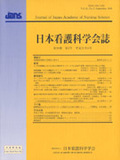Japanese
English
- 販売していません
- Abstract 文献概要
- 参考文献 Reference
要旨
目的:リカバリー評価尺度の特徴について,文献の知見を整理し,わが国での今後の研究課題について示唆を得ること.
方法:PubMed,CINAHL(収載:1995~2008年8月)をデータベースとして,キーワードの,recovery,scale,mental illnessをすべて含む文献や,その引用文献なども含めた中から,計28編の英語文献を対象とし,分析・整理した.
結果:発表されているリカバリー評価尺度は20種類以上あり,測定する対象や方法によって,①リカバリーを連続的スコアにより評価する尺度,②リカバリーを,ステージにより評価する尺度,③リカバリーへの志向・姿勢・知識を評価する尺度,④リカバリーを促進するプログラムや環境を評価する尺度,の4つに分類され,さまざまな介入プログラムに用いられていることが明らかになった.
結論:今後は,日本文化に合ったリカバリーを適切に評価し得るような,日本語のリカバリー評価尺度を開発する必要性が示唆された.
Abstract
Purpose: The present study aims to clarify findings about the features of the recovery-assessment scales obtained by a literature review, and to consider research challenges in Japan.
Method: A literature review covering the period from 1995 to 2008 was carried out using electronic databases (PubMed, CINAHL), by searching the following key words; recovery, scale, and mental illness. Twenty eight English-language papers including cited literature about recovery-assessment scales or about research using these scales were reviewed.
Results: The scales were classified into four types as follows: 1. to assess consumer's recovery by serial score, 2. to assess consumer's recovery by stage, 3. to assess one's orientation for, attitude toward, or knowledge about recovery, and 4. to assess recovery-oriented programs or recovery-promoting environments. And these wide-ranging scales have been used for various recovery-oriented programs.
Conclusion: Further studies in Japan were suggested to develop a Japanese-language recovery-assessment scale that can adequately measure the recovery of Japanese culture.
Copyright © 2009, Japan Academy of Nursing Science. All rights reserved.


